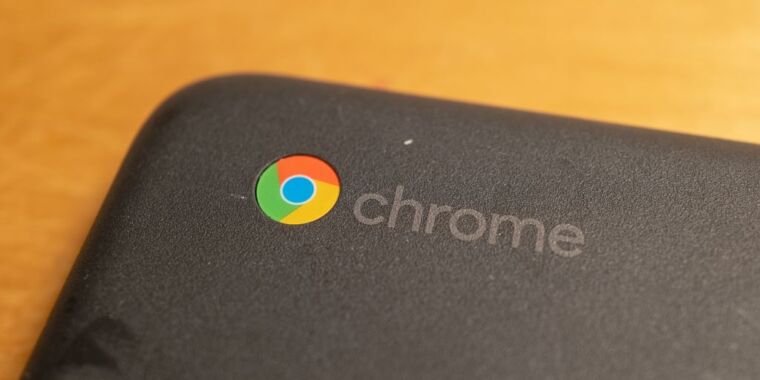This is the best summary I could come up with:
Thirteen Chromebook models have met their death date since June 1 and won’t receive security updates or new features from Google anymore.
The US Public Interest Research Group (PIRG) pointed this out in a press release Wednesday, sharing screenshots of the models:
The US PIRG’s release highlights eight ChromeOS devices from Asus, Acer, Dell, Lenovo, HP, and Samsung, all easily purchasable on Amazon despite their expirations.
The advocacy group’s latest release highlights how easy it is to buy expired laptops, which can lead to security threats, e-waste, and wasted money.
We have been tracking the specific Chromebook models listed in the June letter that recently expired this summer and were shocked to find them still for sale with no warnings.
Retailers need to make changes to protect customers, since Chromebook support expiration dates can be unclear if they’re not included on listing pages.
I’m a bot and I’m open source!

Having been in a school system that only uses chromebooks and the google suite. I can tell you this system hurts tech literacy skills a lot. Not even knowing what an .exe is or how to run it, not knowing basic Microsoft products and other industry standard programs. People who use Chromebooks are also really slow and aren’t technically savvy at all.
This is just a list of more things to add on top of the discussion on why Chromebooks are a terrible investment.

Okay, first of all calling people that use Chromebooks “slow” is maybe a little too far, maybe rein that in a little.
I can tell you from years of experience that using a Windows device isn’t a qualifier for being tech literate at all; the large majority of people don’t make any effort to learn how to use their device effectively, regardless of which OS it’s running.
In my organisation we’d tried giving Chromebooks to users with basic needs but very often they’d return it saying “it’s not good enough”. We’d check the usage reports and so many of them had apparently come to this decision within 30 minutes. We’d give them a Windows device instead and they’d still raise support tickets for basic, Google-able things like setting default apps and how to unmute their sound.
I have this theory that some people are ‘computer people’, in the same way some are dog people or cat people. Everyone else just doesn’t know how to have a ‘relationship’ with a computer and they get frustrated when they can’t immediately understand it.

Everyone else just doesn’t know how to have a ‘relationship’ with a computer and they get frustrated when they can’t immediately understand it.
And those are iPad people.

People who use Chromebooks are also really slow and aren’t technically savvy at all.
Nonsense. I think your opinion is clouded by your limited experience with them.
ChromeOS supports a full Debian Linux virtual machine/container environment. That’s not a feature aimed at non-tech-savvy users. It’s used by software developers (especially web and Android devs), linux sysadmins, and students of all levels.
In fact I might even argue the opposite: a more technically-savvy user is more likely to find a use case for them.
Personally, I’m currently using mine for R&D in memory management and cross-platform compiler technology, with a bit of hobby game development on the side. I’ve even installed and helped debug Lemmy on my chromebook! It’s a fab ultra-portable, bullet proof dev machine with a battery life that no full laptop can match.
But then I do apparently have an IQ of zero, so maybe you’re right after all…

Calling ChromeOS users slow is certainly uncalled for, so I’m not defending the previous poster. Still, I don’t think we should encourage development on ChromeOS.
Google themselves do everything possible to make the platform hell to develop on and for, including breaking Google Cloud Code signin in Jetbrains IDEs, making it impossible to use Flutter Web in Android Studio without a second browser installed in the VM, and preventing gpu access in the VM.
The Android dev experience is better on a Windows or Mac, too, since the Android environment runs in a vm on objectively worse hardware than any modern windows or Mac of comparable price.
I can see why you enjoy ChromeOS (I do/did too), but I think Google is too dumb a company to run a true desktop platform.

I understand the concerns about Google owning the OS, that’s my only worry with my chromebook. If Google start preventing use of adblockers, or limiting freedoms in other ways that might sour my opinion. But the hardware can run other OSs natively, so that would be my get-out-of-jail option if needed.
I’ve not encountered problems with broken support for dev tools, but I am using a completely different tool chain to you. My experience with linux dev and cross-compiling for android has been pretty seamless so far. My chromebook also seems to support GPU acceleration through both Android and Linux VMs, so perhaps that is a device-specific issue?
I’m certainly not going to claim that chromebooks are perfect devices for everyone, nor a replacement for a fully-fledged laptop or desktop OS experience. For my particular usage, it’s worked out great but YMMV, my main point is that ChromeOS isn’t just for idiots as the poster above seemed to think.
Also, a good percentage of my satisfaction with it is the hardware and form-factor rather than ChromeOS per se. The same device running Linux natively would still tick most of my boxes, although I’d probably miss a couple of android apps and tablet mode support.

They tried to give me one of these with an a6 cpu after showing the silver one with an Intel chip, went back immediately.

The joys of planned obsolescence.

